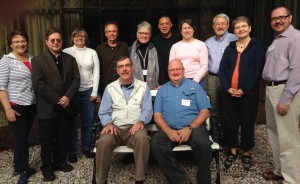 The Task Force on the Study of Marriage was formed via resolution of General Convention 2012. Click HERE for the resolution text.
The Task Force on the Study of Marriage was formed via resolution of General Convention 2012. Click HERE for the resolution text.
One of the resolves called on the Task Force to assist the Standing Commission on Liturgy and Music to address the need for priests to officiate at same-sex marriages in jurisdictions that allow them (which is everywhere in the USA now). While we had MUCH other work to do (please read the resolution linked above), but we knew this particular aspect of our work would garner the most attention.
We were not wrong.
We published our report in November, but had released earlier last year the Dearly Beloved toolkit which is a great resource to parishes, vestries, diocesan committees, etc. to have conversations around marriage. I hope folks will continue to use the toolkit, and a resolution to extend the work of the task force was passed this week, which includes a call for the use of the toolkit church-wide.
Yesterday the House of Deputies received A054 and A036, the two marriage resolutions, from the House of Bishops who had already approved them. A054 authorizes three trial rites (trial rites are defined in the constitution as to be used church wide as steps toward prayer book revision). The first simply allows the I Will Bless You liturgy which was passed in 2012 to include the ability to solemnize the marriage (before it was a blessing liturgy only), and allowing it to be used for any couple, no matter the gender. The other two take the existing marriage rites (Celebration and Blessing of a Marriage and Blessing of a Civil Marriage) but uses gender neutral language. Bishops still have final say if the liturgies can be used in their dioceses BUT must also provide means for couples who want to use them to have access to them. Which basically means they would point them to dioceses that will allow the use.
A036 came out of the task force and was tweaked by the legislative committee on marriage. This proposed change to the marriage canon instructs priests on various aspects of officiating marriages, including following the laws of the state, etc. Gender neutral language was reintroduced, as the marriage canon used to have. Also we greatly improved the declaration of intent, which is to be signed by the couple in the presence of the clergy. The declaration now expressly describes, using language from the prayer book, what the church teaches about marriage. You can go to generalconvention.org which allows you to lookup the full text of resolutions if you so desire, click on the Legislation tag.
Both resolutions passed by very wide margins, after lengthy debate and a vote by orders on both. Those who opposed were appreciative of the way the resolutions offer “protection” for those whose theology disagrees with these resolutions. They also appreciated how debate took place so respectfully.
These resolutions take affect on the 1st Sunday of Advent, 2015. Bishops will determine the use of the trial liturgies in their dioceses,so look for communications from your bishop regarding this soon.
Obviously coming on the heels of the SCOTUS decision, these resolutions are quite significant. As a member of the Task Force on Marriage I am proud of the work we did together, the essays produced, the toolkit and the very carefully constructed change to the marriage canon. I am happy with how the bishops amended the resolutions and how the deputies responded. I am excited the work of the task force will continue and will expand and will also include more diversity in culture and theology. I sure do hope to be included but I realize that may not happen.
Meanwhile the HoD approved some resolutions on restructuring our governance. We were pretty timid in accepting the recommendations of TREC. The Executive Council remained the same size. We did eliminate all CCABs (there are over 60 interim bodies) except one on Constitution and Canons and one on Liturgy and Music. All other matters needing work will be handled by task forces either appointed by GC or the Executive Council. Task Forces expire at General Convention unless extended by action of GC, which should help tremendously.
Long sessions today with a lot of resolutions to consider. My iPad is misbehaving, consequently it took for EVER to type and post this so y next posts will probably come from home, as I leave early Friday morning.